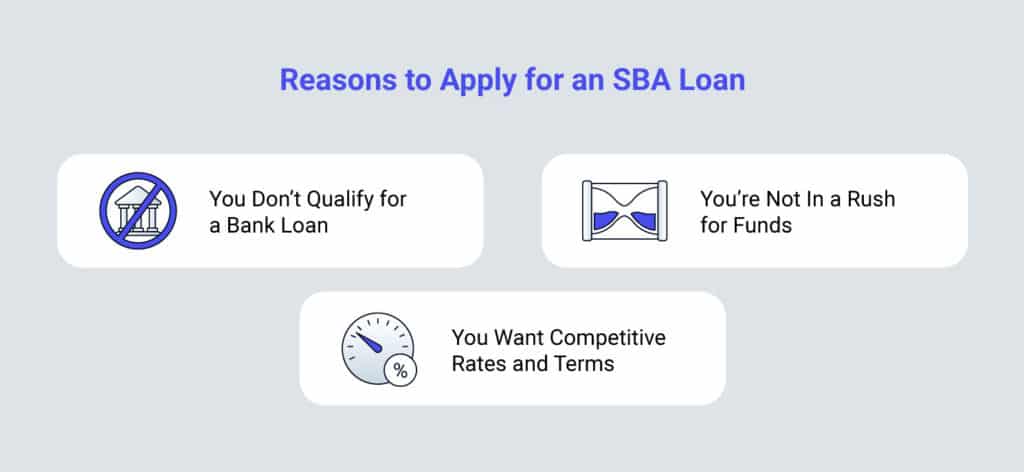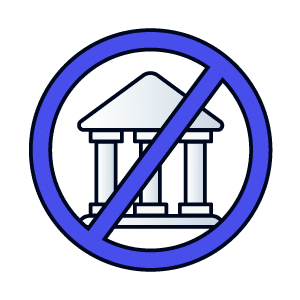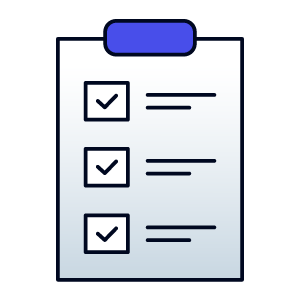According to a 2022 survey on small business credit conducted by the Federal Reserve Banks, SBA loans or lines of credit were the most popular financing option among surveyed applicants, with 44% of small business firms having applied for them.
For business owners seeking capital to grow their operations, particularly those who can afford to wait for the best rates and terms, an SBA loan is an ideal choice.
At iBusinessLender, we work with a network of reputable lenders across the country. Through these trusted partnerships, we provide access to financing options from well-known SBA programs, including the 7(a) and Express loans.
Contents
SECTION 1
Understanding SBA Loans
SBA loans cater to both short-term working capital needs and long-term financing requirements, specifically designed to meet the diverse needs of small businesses. These loans are exclusively available to eligible small business owners through lenders approved by the SBA. They often come with government guarantees, which help secure lower interest rates and fees within established limits.
How Do SBA Loans Work?
SBA loans operate by reducing the risk that lenders face when extending credit to small business owners. If a borrower defaults on a loan, the Small Business Administration compensates the lender for a portion of the outstanding amount, with the specific percentage varying depending on the loan type.
As a result, participating lenders are more inclined to consider a wider range of applicants and offer more favorable terms. This arrangement makes it easier for small businesses to access lower interest rates, longer repayment periods, and manageable loan payments.
What’s the Difference Between an SBA 7(a) and an Express Loan?
Standard 7(a) Loans
The SBA 7(a) loan program provides loans of up to $5 million to small business borrowers. These loans can have maturity terms ranging from 7 to 25 years, depending on the purpose of the loan.
For loans over $150,000, the SBA guarantees 75% of the loan amount, while loans up to $150,000 are guaranteed up to 85%. Although the interest rates on SBA loans are negotiable, they are generally variable and linked to the current Prime rate, which is 7.5%, plus an additional lender rate. Currently, SBA lenders can charge variable interest rates between 9.75% and 12.25% for standard 7(a) loans, depending on the loan amount and term.
The process for finalizing a standard SBA loan, from application to disbursement of funds, varies among lenders but typically takes between 60 and 90 days.
SBA Express Loans
For business owners needing quicker access to funds, the traditional SBA loan process might be too slow. SBA Express loans offer a faster alternative, making them ideal for those needing rapid financing.
When applying for an SBA Express loan, lenders usually make a decision within 36 hours. Once approved, the funds can be deposited into your business account in as little as 7 days.
However, the expedited process comes with certain limitations, such as lower borrowing limits and higher interest rates. Under the SBA Express program, borrowers can access up to $500,000 with repayment terms ranging from 5 to 10 years. The SBA guarantees up to 50% of the loan amount. Lenders can charge a maximum interest rate of 12% for loans over $50,000, and up to 14% for loans of $50,000 or less.
By understanding the differences between these two types of SBA loans, small business owners can make informed decisions about which financing option best suits their needs.
SECTION 2
When Is a SBA Loan the Right Choice?
You might be wondering why you should consider an SBA loan when there are so many financing options available. Here are a few compelling reasons:
You Don’t Qualify for a Bank Loan
If you’ve been denied a traditional bank loan, an SBA loan could be a viable alternative. The SBA guarantee reduces the risk for lenders, making it easier for more borrowers to qualify for funding. This guarantee acts as a safety net, encouraging lenders to offer loans to businesses that might otherwise be seen as too risky.
You Want Competitive Rates and Terms
SBA loans are known for their competitive rates and favorable terms. They often stand as a top choice, second only to conventional loans, when it comes to interest rates and conditions. The interest rates on SBA loans are capped, ensuring that lenders cannot charge more than a predetermined maximum. Additionally, for those who need longer repayment periods, SBA loans offer terms that can extend up to 25 years, providing flexibility and affordability.
You’re Not In a Rush for Funds
While SBA Express loans provide a faster approval process compared to other SBA loans, the overall process for SBA loans generally takes time. From application to approval and disbursement, it can be a lengthy procedure. If you don’t need immediate access to funds and can afford to wait, an SBA loan could be an excellent fit for your business needs. The wait can be worthwhile given the favorable terms and rates associated with these loans.
By understanding these key benefits, you can better determine if an SBA loan aligns with your business’s financial needs and goals.

SECTION 3
What Does an SBA Loan Cost?
Your SBA business loan payment will depend on the program, the amount borrowed and the term.
SBA lending partners can charge a maximum variable interest rate as follows:
| SBA Loan Type | Loan Amount | Interest Rate
(Prime = 7.5%) |
| SBA Express | Up to $50,000 | Prime + 6.5% |
| SBA Express | $50,000-$500,000 | Prime + 4.5% |
| SBA 7(a) < 7 years | $25,000 or less | Prime + 4.25% |
| SBA 7(a) < 7 years | $25,001-$50,000 | Prime + 3.25% |
| SBA 7(a) < 7 years | $50,000 and up | Prime + 2.25% |
| SBA 7(a) ≥ 7 years | $25,000 or less | Prime + 4.75% |
| SBA 7(a) ≥ 7 years | $25,001-$50,000 | Prime + 3.75% |
| SBA 7(a) ≥ 7 years | $50,000 and up | Prime + 2.75% |
Be aware that some SBA lending partners charge an origination fee or loan packaging fee.
Additionally, the SBA charges a guarantee fee, which is passed on to the borrower. Upfront guarantee fees for 7(a) loans, which include Express loans, are outlined below.
| Loan Amount | Guarantee Fee (Loans With Maturity Exceeding 12 Months) |
| $350,000 or less | 0% |
| $350,001 – $700,000 | 2.77% of the guaranteed portion |
| $700,001 – $1 million | 3.27% of the guaranteed portion |
| $1,000,001 – $5 million | 3.5% of the guaranteed portion up to $1,000,000, plus 3.75% of the guaranteed portion over $1,000,000 |
| Loan Amount | Guarantee Fee (Loans With Maturity of 12 Months Or Less) |
| $350,000 or less | 0% |
| Greater than $350,000 | 0.25% of the guaranteed portion |
Example of an SBA Loan
Let’s consider an example of how an SBA 7(a) loan can work for your business:
Suppose you’ve successfully secured an SBA 7(a) loan for $35,000 with a term of 10 years. Your lender has set an interest rate of 7.25%. Unlike many loans, there’s no upfront guarantee fee involved. Using a rough estimate from an SBA loan calculator, your monthly payment is projected to be approximately $410.
This scenario highlights the affordability and predictability that SBA loans can offer small business owners. With competitive interest rates and manageable monthly payments, an SBA loan can provide the financial support needed to grow and sustain your business over the long term.
SECTION 4
How to Qualify for an SBA Loan
Before applying for an SBA loan, ensure your small business meets these criteria:
- Operate as a for-profit entity: Your business must operate with the intention of making a profit and contributing to the economy.
- Conduct business within the United States: SBA loans are available only to businesses operating within the United States, including its territories.
- Owners should have equity to contribute: Owners are typically expected to invest their own money or assets into the business.
- Exhaust all alternative financing avenues: You should demonstrate that you have explored other financing options before applying for an SBA loan.
- Collateral for standard 7(a) loans of $25,000 or more: Loans above $25,000 generally require collateral to secure the loan.
Certain business types are ineligible for SBA programs, including real estate investment firms, banks, and businesses primarily involved in gambling.
Working with an SBA-Approved Lender
It’s essential to collaborate with an SBA-approved lender who understands the program’s requirements. Our partners at iBusinessLender work with these lenders to ensure a thorough evaluation process, which includes:
- Credit score: Lenders assess your credit history to gauge your creditworthiness.
- Recent bank statements: These statements provide insights into your business’s financial health and cash flow.
- Financial statements: Current financial statements help lenders understand your business’s profitability and financial stability.
- Current debt obligations: Lenders consider your existing debt to assess your ability to take on additional financial obligations.
Applicants are expected to demonstrate a history of positive cash flow and sufficient capital reserves to support ongoing operations and meet monthly SBA loan payments and other financial commitments. Additionally, SBA loan requirements mandate a clean financial track record, which typically excludes recent bankruptcies, foreclosures, and open tax liens. This ensures that borrowers can responsibly manage and repay their loans.
iBusinessLender Minimum Qualification
Ready to apply for an SBA loan online? At iBusinessLender, you can if you meet the following minimum requirements:
- 650+ credit score
- 2+ years in business
- $50,000 or more in annual revenue
SECTION 5
SBA Loans Through iBusinessLender
What Sets Us Apart
Many small businesses have trusted us with their financing needs and it shows in our ratings.
While SBA loans can be tricky for borrowers to navigate, our expert Business Advisors are standing by to ensure a smooth process. They will offer industry guidance and answer any questions you have.
How to Apply
Our online SBA loan application is easy to complete. (Bonus, you’ll see what other financing options you qualify for too.)
Get started in 3 steps:
- Tell us about yourself and your business
- Attach recent bank statements
- Compare your offers
You’ll be paired with a Business Advisor who will be on hand to answer any questions you have.
SECTION 6
SBA Loan: Frequently Asked Questions
SBA 7(a) and Express loans offer flexibility in how you can use the funds for your small business needs. Here are several common uses:
- Real estate: Purchase or refinance commercial real estate properties.
- Working capital: Cover day-to-day operating expenses, such as payroll and inventory.
- Fixed assets: Acquire machinery, equipment, or other necessary assets for business operations.
- Expansion: Fund initiatives to grow your business, such as opening new locations or increasing production capacity.
- Equipment: Purchase or lease equipment essential to your business operations.
- Inventory: Finance the purchase of inventory to meet customer demand.
- Construction: Fund new construction projects related to business expansion or improvement.
- Renovation: Upgrade or renovate existing business facilities to improve functionality or aesthetics.
- Debt refinancing: Consolidate and refinance existing debts, potentially reducing overall interest costs and simplifying payment schedules.
These loan options provide small business owners with the financial flexibility to pursue various growth strategies and operational improvements. Whether you’re looking to expand your facilities, upgrade equipment, or manage cash flow more effectively, an SBA 7(a) or Express loan could be a valuable financing solution tailored to your business needs.
The timeline for finalizing an SBA loan can vary depending on the type of loan you choose:
Standard SBA Loan
The process of securing a standard SBA loan, from initial application to receiving funds, varies among lenders but generally spans between 60 to 90 days. This timeframe allows lenders to thoroughly assess your application, review necessary documents, and finalize the loan agreement.
SBA Express Loan
For business owners seeking expedited financing, the SBA Express loan offers a significantly faster turnaround. Once you submit your application, lenders typically make a decision within 36 hours. Upon approval, funds can be deposited into your business bank account in as little as 7 days. This accelerated process is designed to meet the urgent financial needs of small businesses, providing quick access to capital for immediate growth opportunities or operational expenses.
Choosing between a standard SBA loan and an SBA Express loan depends on your business’s specific financial requirements and timeline. Whether you prioritize speed or prefer a more comprehensive evaluation process, both options offer valuable financing solutions to support your business’s success.
Several factors can lead to the rejection of an SBA loan application, including:
- Poor credit history: A low credit score or past payment issues can impact your eligibility.
- Inadequate collateral: Insufficient assets to secure the loan may result in denial.
- Prior defaults on government loans: Previous issues with repaying government-backed loans can raise concerns.
- Character concerns: Issues such as criminal history or questionable business practices may affect approval.
If your SBA loan application is denied, you have options to explore:
Reapplying for an SBA Loan
You can address any deficiencies in your application and reapply for an SBA loan. Work on improving credit, securing additional collateral, or resolving past issues to strengthen your chances of approval.
Exploring Alternative Financing Options
Consider alternative financing solutions that may have less stringent requirements, such as:
- Short-term loans: These loans offer quick access to capital with shorter repayment terms, often suited for immediate funding needs.
- Merchant cash advances: Ideal for businesses with consistent credit card sales, these advances provide upfront cash based on future credit card sales.
Exploring these alternatives allows you to find a financing option that aligns with your business’s current financial situation and goals. It’s essential to evaluate the terms, interest rates, and repayment schedules to make an informed decision that best supports your business’s growth and stability.






